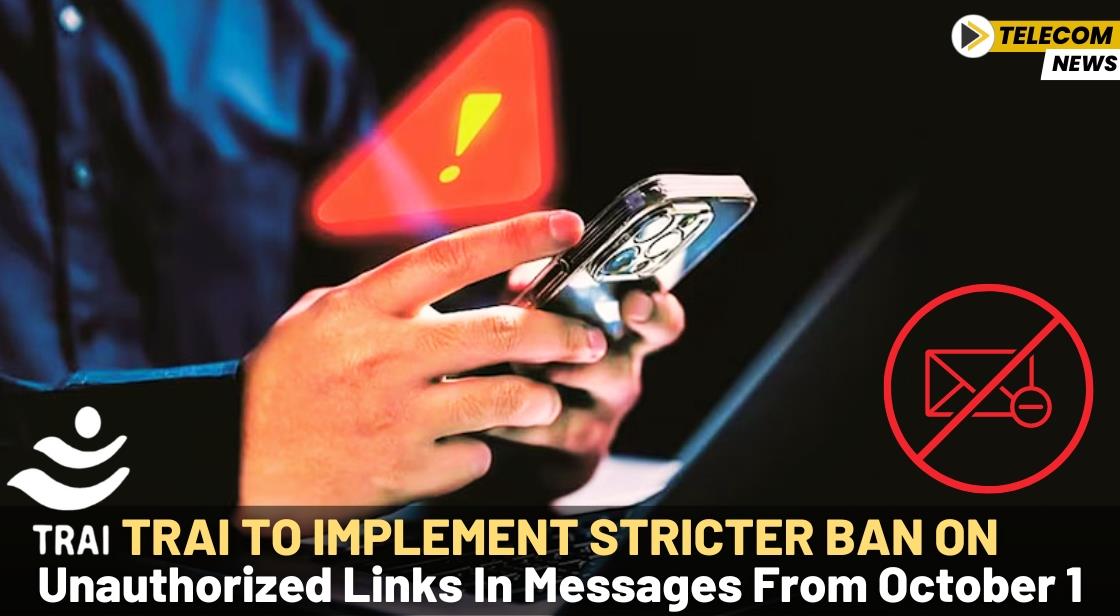TRAI to Implement Stricter Ban on Unauthorized Links in Messages from October 1

News Synopsis
Starting from October 1, 2024, the Telecom Regulatory Authority of India (TRAI) will introduce new measures aimed at preventing unauthorized and potentially harmful links from being embedded in mobile messages. This is part of the authority's broader initiative to ensure enhanced communication security and protect consumers from malicious or unwanted link-based content.
The new regulations state that only authorized senders will be permitted to include URLs, Android Package Kits (APKs), or Over-The-Top (OTT) links in their SMS communications. Unauthorized links will be blocked from SMS traffic to help reduce the number of spam messages, phishing attacks, and other malicious practices that exploit consumers through mobile communication.
TRAI’s August Directive: Key Guidelines for Access Providers
In a significant move, Telecom Regulatory Authority of India (TRAI) issued a directive on August 20, 2024, instructing all access providers to block SMS traffic containing URLs, APKs, or OTT links that are not part of an approved whitelist. The implementation of this rule is critical for curbing the rampant misuse of unauthorized links.
According to the new regulation, registered senders who wish to include such links must submit their whitelisted URLs to access providers' portals. This will ensure that their SMS traffic continues uninterrupted.
"Only authorized senders will be permitted to include URLs, APKs, or OTT links in their messages," as per the TRAI directive.
High Compliance from Registered Senders So Far
So far, the industry has shown significant compliance with the new guidelines. Over 3,000 registered senders have already uploaded their whitelisted links, with more than 70,000 links successfully approved by access providers.
TRAI’s initiative encourages greater accountability and transparency among telecom operators and content providers, while protecting users from spam and malicious content. Unregistered or non-compliant senders will be barred from sending messages containing links after the October 1 deadline.
The Implications for Consumers and Businesses
TRAI’s push for stricter link regulation in SMS messages is primarily designed to protect consumers from the ever-growing menace of spam and phishing attacks, which often exploit malicious URLs to steal personal data or install harmful software. Phishing attacks through SMS, also known as smishing, have become a major concern in recent years, with cybercriminals targeting consumers by sending fraudulent messages with dangerous links.
This move is also seen as a win for legitimate businesses and service providers who use SMS to communicate with their customers. With the implementation of whitelisting, consumers will be able to trust that messages containing links are from authorized sources.
Consequences of Non-Compliance
"Any sender who fails to whitelist their links before the deadline will be barred from sending messages containing such links," TRAI warned.
Senders who do not comply with the new rules will face a complete ban on message traffic that includes URLs, APKs, or OTT links. This could have a severe impact on businesses that rely on SMS-based communication to engage with their customers.
Access providers, which include major telecom companies, will also be held accountable for enforcing these new guidelines. They are required to block all unauthorized message traffic, and failure to do so may result in penalties or other regulatory actions.
Conclusion:
TRAI's new regulations, set to take effect on October 1, 2024, mark a significant step toward securing mobile communication in India. By banning unauthorized URLs, APKs, and OTT links in SMS, the authority aims to protect consumers from rising threats like phishing and smishing. This move also ensures that businesses and legitimate senders use verified and safe links, fostering trust and accountability in SMS-based communication.
While compliance requires effort from telecom providers and senders, the outcome will be a safer and more transparent digital environment for all mobile users. As the deadline approaches, it is critical for senders to act promptly to avoid disruption, while consumers can look forward to safer interactions on their mobile devices.
You May Like









